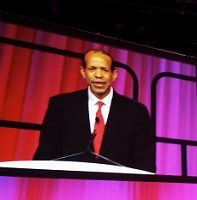Article
ACC Opener: Turning off the Spigot in Heart Disease
Author(s):
There were hundreds of presentations on high-tech innovations and the latest drugs for heart disease. But unless cardiologists find better ways to prevent cardiovascular illness, deaths will keep rising, the ACC's Kim Williams, MD said in his welcome speech.

Population health is the newest strategic priority of the American College of Cardiology (ACC) and this morning’s opening of its 65th Annual Scientific Session and Expo in Chicago, Il, showcased three distinct voices speaking to that common theme.
Historically, cardiology has been a field known for innovations in drugs and medical interventions to help patients recover from damage already done.
But the ACC’s President Kim Allan Williams, Sr, MD, (photo left) said that’s about to change.
“We must turn off the faucet instead of just mopping the floor,” Williams said, referring to the specialty’s focus on dealing with late stage cardiovascular disease, an illness that took 17.5 million lives in 2013 and is projected to take 23.6 million by 2030.
He warned of the dangers of relying on medicine to address health problems patients might be bringing on themselves.
Before his welcoming speech, Williams introduced a video address by fellow Chicagoan and population health advocate First Lady Michelle Obama.
She highlighted her own efforts to address the nation’s obesity crisis, with her “Let’s Move” kids' fitness advocacy initiative. She praised the nation’s cardiologists for supporting the program and urged them to do more.

"Today I want you to know how grateful I am for everything you’re doing to help people across this country live longer, healthier lives," she said..
Population health was also the topic of featured lecturer, David B. Nash, MD, MBA, a talk entitled “Population Health: Is it the Secret Sauce?” Nash is Dean of the Thomas Jefferson University’s Jefferson School of Public Health in Philadelphia, PA.
Forty percent of deaths from heart disease could be prevented if people maintained a healthy weight, didn't smoke, didn’t drink too much alcohol, and exercised regularly, Nash said, but only 3% of the population comply with those directives.

He illustrated his talk with graphics that made his points—such as a digitally altered photo showing Michelangelo’s statue of David with a huge belly. (photo right)
Nash also called on physicians to embrace the new world of “transparency, accountability, and “no outcome, no income.”
That means adopting ‘best practices” and being willing to change.
“There cannot be 15 different ways to treat patients with heart failure,” he said, and guidelines ought to reflect the best treatments.
“In God we trust, but everybody else--outcome measures,” Nash said.
Nash too embraced a model of care that stresses prevention, but Williams spoke not just as the leader of the ACC but from his own efforts to be healthier.
“As I like to say, don’t let your culture hold your heart hostage,” he said.
The program lineup this year features scores of studies of medical interventions and pharmaceuticals, but it also includes studies that focus on risk reduction.
The ACC hopes to take leadership roles in all three areas, Williams said.
On the pharma front, he said the ACC needs to continue to address the problems of health disparities created by the high prices of some drugs.
“Pay or pain” or “buy or die” policies should not exist, Williams said.
(Photos by Megan Daily)





